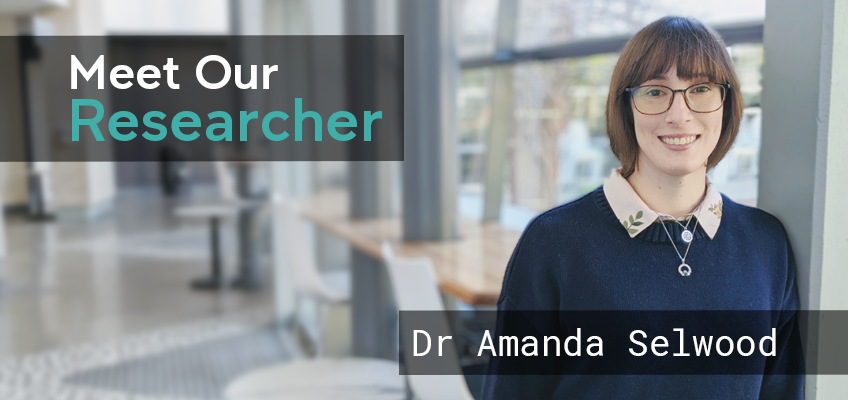19 Aug 2020

Dr Amanda Selwood is relatively new to CHeBA; having had the unusual experience of commencing a new job without in-office contact. However, Dr Selwood has found a sense of belonging through engaging with CHeBA’s campaigns, in particular the #InThisTogether social media campaign which featured snapshots of CHeBA’s researchers sending messages of support to our study participants, colleagues and broader CHeBA community.
How did you get into researching the ageing brain?
I completed my PhD in Cognitive Science at Macquarie University. I was looking at twin and sibling relationships and how this affects their shared memories, for instance, autobiographical episodic and semantic memories. After this, I conducted health services research to enhance practitioner decision-making regarding highrisk surgical patients. This research was thought-provoking because we found there is no way to accurately recognise a frail or high-risk patient; age is no longer as clear a risk factor as it used to be. I also worked as a Research Associate at UNSW Sydney in the Faculty of Art and Design as an experimental psychologist working with a team of research artists. Here we looked at whether photography could improve older adults’ episodic memory of events. I enjoyed interacting with the older adult participants. However, I only really got into researching the ageing brain recently when I started working for the Older Australian Twins Study.
Did you experience a ‘defining moment’ which led you to this field?
I am an identical twin myself, so you could say that was a defining moment that led me to twin research. However, it was when I first worked with older adults during my time at UNSW Art and Design that I became particularly interested in the ageing brain. You could get two 82-year olds and they would be completely different in terms of both their physical health and cognition.
I became fascinated by why some people seem to age well and other people seem to decline much earlier in life, and this led me to seek work in this field.

Do you have any personal interests or activities which are protective behaviours against cognitive decline?
I try to keep healthy and fit. I have been doing dragon boat racing competitively for over seven years now. Paddling with a team means I get out on the water with a group of other people several times a week and doing very intense exercise. I find it doesn’t just improve my physical fitness but also keeps me socially engaged, with both of these factors considered protective for cognitive health. It is great being part of a community where we are all motivated to eat healthily and maintain a strong level of fitness. Racing competitively means that I am continually trying to learn and improve my technique to help my team.
What are you currently researching?
I started working with CHeBA’s Older Australian Twins Study in March this year, so I am relatively new to the study. I am enjoying it because I can interact with the participants again, onboarding them to the project and working through the process with them over the phone and online. The study measures many behavioural and environmental factors to better understand healthy ageing, in particular lifetime physical and mental activity, physical and psychological trauma, early-life socio-economic environment and nutrition, among others.
Why is your research important?
Studying twin ageing is important because we can distinguish between the genetic and environmental components of ageing. Many people think that environmental influences are the most critical factor as you age, which may be true, but genetic influences may be equally important.
This study allows us to tease out what factors are genetic and what we can mitigate so we can come up with strategies to enhance healthy brain ageing.
What do you love about working for CHeBA?
I only had one day in the office when I started back in March and then we went into lockdown due to COVID-19. I have been working from home since. Even so, I feel very much part of the team. Everyone has been welcoming, and I have enjoyed engaging with CHeBA’s social media campaigns. It highlights how supportive and collegial CHeBA is.
What is the ultimate hope you have for your research?
My ultimate hope is to help people age as well as possible. It is not just about prolonging people’s lives. It is about giving people strategies and resources to achieve a better quality of life. My goal is to discover how we can make our own lives better as we age, as well as the lives of the people we love.
This interview was undertaken during the COVID-19 self-isolation period. Amanda Selwood found that having video calls with her family and doing a virtual world tour by cooking foods from a different country each week have supported her mental resilience and kept her feeling socially connected while physically isolated.
Donations are fundamental for critical research to continue following COVID-19.
If you would like to discuss supporting Dr Selwood's work specifically, or would like information
on leaving a legacy via a Gift in your Will, please contact h.douglass@unsw.edu.au.

Dr Amanda Selwood is a Research Assistant with CHeBA’s Older Australian Twins Study (OATS). The study aims to distinguish between environmental and genetic factors contributing to the ageing process, specifically markers of healthy cognitive ageing. Dr Selwood obtained her PhD in Cognitive Science at Macquarie University. To stay physically fit and socially engaged she is highly involved in a community of dragon boaters; a competitive paddling group in Sydney.
